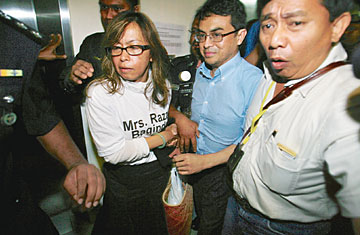
IN THE SPOTLIGHT: Prominent Malaysian Abdul Razak Baginda, center in blue shirt with his wife by his side, has pleaded not guilty to abetting the murder of Mongolian model turned interpreter Shaariibuu
Malaysia, a tidy Southeast Asian nation that is often held up as a model of a Muslim-majority democracy, doesn't usually play host to a murder trial that seems better suited to an episode of The Sopranos. Indeed, the killing of model turned interpreter Altantuya Shaariibuu last October has riveted this country of 25 million. First, there is the sheer luridness of the case. Then, there are the political implications: some Malaysians think it might hurt the succession hopes of Deputy Prime Minister Najib Razak. For others, the trial, which opened last month, serves as a bellwether of the integrity of Malaysia's legal system and its burgeoning press. Prime Minister Abdullah Ahmad Badawi has vowed to make protecting such institutions a cornerstone of his administration. Yet the legitimacy of the Shaariibuu case was already questioned last month when the original chief prosecutor was removed just hours before the trial was to begin. Before that, several local journalists were briefly detained after covering the case. Although Malaysian newspapers have reported extensively on the trial since then, certain scandalous details emerging from the past week's testimony have been omitted from many local press reports.
The story begins in 2004 when a polished Malaysian think-tank director named Abdul Razak Baginda met the comely Shaariibuu at a party in Hong Kong. A married father, Abdul Razak, now 47, had been educated in Britain, had written several books on Malaysia's political economy, and was known to be close to Deputy PM Najib. Abdul Razak and Shaariibuu began a romantic relationship, meeting up for secret liaisons across Asia. Eight months later, Abdul Razak broke off the affair, according to the prosecution and a court affidavit filed by him. Abdul Razak alleges that Shaariibuu then began blackmailing him, presumably threatening to make their relationship public if he did not pay up.
By the spring of 2006, however, Abdul Razak says he stopped sending money. In October, Shaariibuu traveled to the Malaysian capital Kuala Lumpur. In his affidavit, Abdul Razak says that after Shaariibuu showed up in town, he confided about her to a high-ranking security officer who worked for Najib. Then, on Oct. 19, according to Abdul Razak's affidavit, the think-tank head called a police officer associated with a high-level unit that provided security for top Malaysian leaders to tell him Shaariibuu was outside his house. Soon after, a car with three police agents pulled up and took the Mongolian woman away. That was the last Abdul Razak says he saw of his former paramour.
On Nov. 6, Shaariibuu's burned remains were found in a jungle outside Kuala Lumpur. Abdul Razak has pleaded not guilty to abetting murder; the two policemen charged with carrying out the killing have pleaded not guilty, too. If convicted, all three could face the death penalty.
Just how the case will affect the Deputy Prime Minister is not yet clear. Najib, the heir apparent to PM Abdullah, has denied any involvement, stating that he never even met Shaariibuu. But on June 29 a court witness claimed she had seen a photo of Abdul Razak, Shaariibuu and a man she named as "Najib Razak" dining at a Paris restaurant. Najib has refused to comment on this specific testimony. "The longer he tries to avoid the issue, the more wild the rumors will be," says Lim Guan Eng, secretary-general of the opposition Democratic Action Party. "The government wants to be known as serious about transparency and justice, but this case damages those efforts."
This isn't the first time Malaysia's court system has faced scrutiny. Nearly a decade ago, then Deputy Prime Minister Anwar Ibrahim was jailed for sodomy and abuse of power—a ruling condemned as political by human-rights groups. Now, Anwar is leading the charge against high-ranking members of his former political party. "Any hint that the integrity of the system has been compromised during the investigation and trial will further erode the public's faith in the institutions of governance," Anwar said in a press statement.
For his part, Najib's boss, PM Abdullah, has promised that politics will not influence the outcome of the trial. But any link to such a high-profile murder can't be good news for Malaysia's leaders. The case will likely continue over the next month, just as the Southeast Asian nation gears up to celebrate a half-century of freedom from British rule. With so many salacious details emerging from court testimony, Malaysia can only hope that its trial of the century does not overshadow 50 years of independence.
